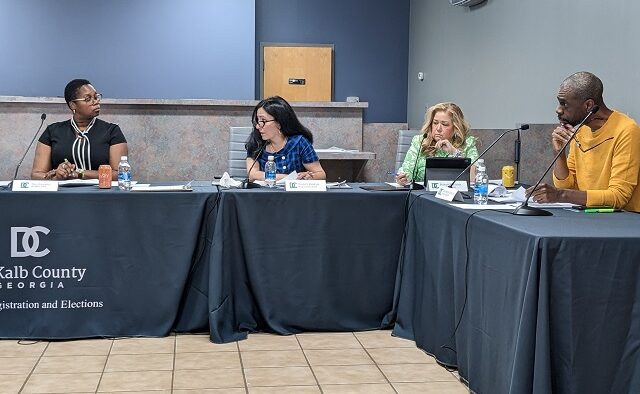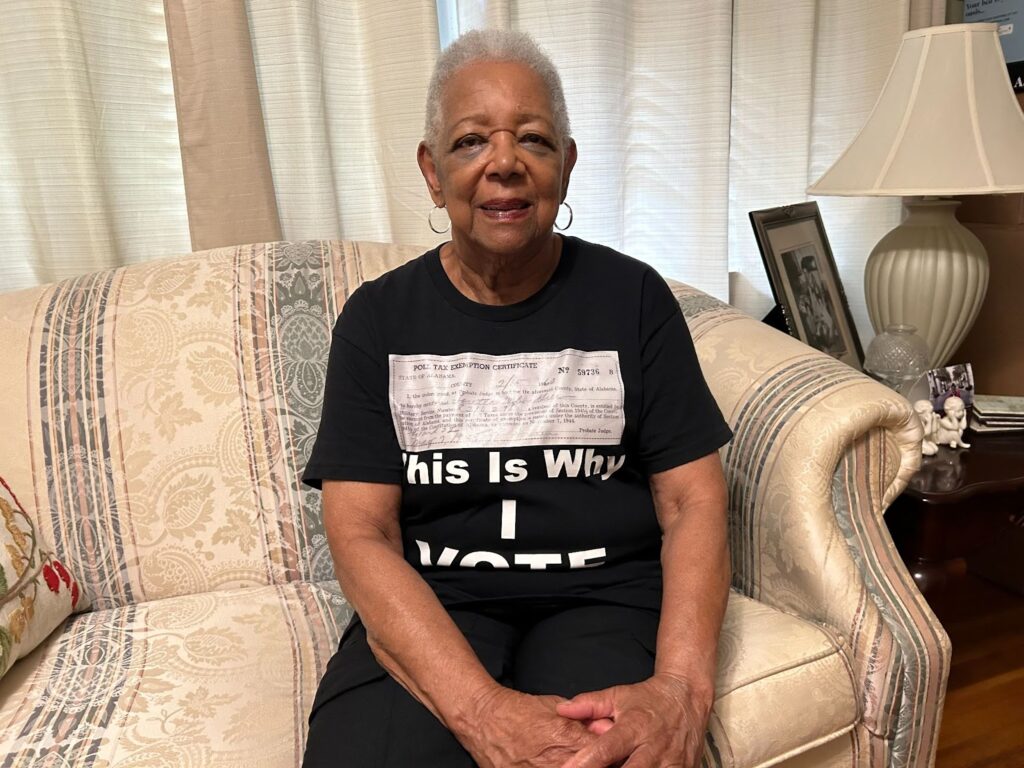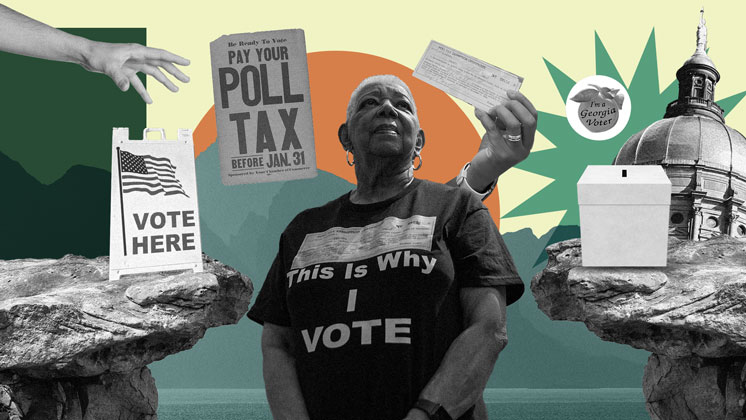“Sing a song full of the faith that the dark past has taught us, Sing a song full of the hope that the present has brought us; Facing the rising sun of our new day begun, Let us march on till victory is won.”
– Excerpt from Lift Every Voice and Sing by the Johnson Brothers.
The goal of antebellum Southern capitalists for African Americans was determined for them to permanently be an underclass and serve perpetually in some form of slavery. While the Declaration of Independence proclaimed “all men are created equal,” the founders of America, and those who interpreted their words for personal and capital gain, anathematized themselves with perpetual dissidence from the people they enslaved even though, by law, they had no rights at the time of their chattel enslavement.
African Americans have lived in this country through elongated periods of mass disenfranchisement; it wasn’t until the passage of the Voting Rights Act of 1965 that America became some sort of democracy. Relatedly, there is a legitimate argument to be made that it wasn’t until the federal government intervened to ensure voting rights for African Americans that the complete picture of democracy could be actualized for not only Black voters but for all Americans, despite their skin color, religion, or sexual orientation. Since the passage of the VRA, there have been constant attempts to startle the efforts African Americans have led in taking access to their rights guaranteed to them by the Constitution.
In 2013, Shelby V. Holder killed the requirements in Section 4(b) of the VRA to determine which jurisdictions are subject to the preclearance requirement of Section 5. With the election of Donald Trump in 2016, his additions to the Supreme Court, and MAGA extremism coming to the forefront of the Republican Party and the mainstream face of neo-white fascism, many state legislatures have been empowered to enact laws and practices that overall aim is to reduce voting for African Americans, other communities of color and younger voters.
In March 2021, the Governor of Georgia, Brian Kemp, signed SB 202 into law through the backing of a largely MAGA-dominated state legislature. SB 202 created new voting restrictions—including limits on the use of absentee drop boxes; under the new system, counties have a maximum of one box per 100,000 registered voters.
Fulton County is allowed eight absentee ballot drop boxes, and when juxtaposed with the 2020 elections, there were 38 ballot drop boxes. Fulton County has a population of 42.5 percent Black people living there, according to the 2020 census. The 90-plus page legislation looks to
“Comprehensively revise elections and voting; to amend Chapter 2 of Title 21 of the Official Code of Georgia Annotated, relating to elections and primaries generally, to revise a definition; to provide for the establishment of a voter intimidation and illegal election activities hotline; to limit the ability of the State Election Board and the Secretary of State to enter into certain consent agreements, settlements, and consent orders…”
In more transparent terms, the goal of SB 202 comes down to a few provisions that detractors say directly infringe on the rights of Black and low-income voters: access to absentee ballots and drop boxes, providing food and water to voters waiting in longer-than-normal lines and neutralizing the role of the Secretary of State’s office in elections.
Recent legislative sessions introduced Georgia voters to even more roadblocks in the form of SB-189. The bill has gone further to dismantle the votes of Black voters and other mobilized communities. Created in the legacy of confusion, SB 189’s foundation comes from a state legislature that believes the 2020 election was stolen. The state law allows baseless voter challenges and undermines hard-working election workers by making them process these challenges in a shorter window.
However, bills focused on limiting working-class, Black, and poor Georgian voter power under the guise of making elections safer and more accessible for those same people continue to expand the goals of a legislative body far removed from the will of the people.
Also, the bill requires all absentee and advance ballots to be counted within an hour of polls closing, which could prove impossible. This brand of policy tactics has grabbed the attention of countless election activists and officials across the state who have taken up the mantle to prevent a full-scale backslide to pre-Civil Rights Movement conditions.
Dele Lowman, for instance, believes that the conservative caucus of the Georgia state legislature has kept electoral control at the forefront of its political agenda. “The general assembly has passed more and more legislation to try and exert control over the franchise and to achieve the aims of the dominant party of the general assembly, which is not in the interest of the majority of Georgians,” Lowman told The Peach Pit.
According to a 2024 Marist poll, 69 percent of Georgia residents are either very confident or confident in their local officials’ ability to conduct a fair and accurate election. However, bills focused on limiting working-class, Black, and poor Georgian voter power under the guise of making elections safer and more accessible for those same people continue to expand the goals of a legislative body far removed from the will of the people — of Black voters. Lowman explains, “The basis of all of this has been to try and remove enough voters from the voter roll to cover those 11,000-odd votes that [former President] Donald Trump did not get in 2020. “[The Georgia State Senate] can use all of the cynical covers of ‘integrity’ and ‘protecting democracy’ and all of the 1984-style language that they want, but that is what it is about.”

Lowman served four years as Chair of the board of registration and elections in Dekalb County and was a recent mayoral candidate in Stonecrest, Georgia. Though her charge in these roles was to serve voters who voted on all sides of the issues, she warns that “we have to be very clear about the political implications and the political dynamics that are driving these [voter-targeted] issues.”
Those out in the field speaking with voters feel that sitting out and apathy is not an option in November for African Americans or freedom fighters nationwide who want a democracy that lasts beyond this present day. Young, Black voters in Georgia are especially at risk of the effects of legislation and policy initiatives that target voter participation and turnout. Lowman points out, “What we’re voting on will affect their future – we’re making decisions about their future that they have no say in.”
Despite this fact, the youth have shown they are politically active and issue-driven as they face censorship over speaking out on several issues regarding self-identity in schools, the banning of books, and the ongoing conflicts in Palestine, Sudan, and the Congo. When engaging with younger generations of voters or soon-to-be voters, it becomes apparent that their world—the state they live in—is entirely dependent on their political activity and engagement.
“I think many people might be surprised by how much 17-year-olds, regardless of [their political exposure], understand,” Lowman posits. “[During] my mayoral campaign, I got to go and knock on doors with about three high school football teams. We were just talking – these are a bunch of Black boys in South Dekalb walking around on a Saturday morning talking about our city. “They could articulate, without prompting, what they wanted to see and what was important to them. So, it was very easy for me to have a conversation with them about how voting would allow them to influence what they see is missing from their community and what they need in order to thrive.”
The first African American U.S. Supreme Court Justice, Thurgood Marshall, once said the Constitution was “defective from the start.” On the 200th anniversary of the constitutional convention, he later said that the founders “consented to a document which laid a foundation for the tragic events which were to follow.”
Black voters have always been a glaring example; in the face of the protruding and engulfing elements of white Christian Nationalism and fascism, we have served as the foundation of America and allowed the experiment of Democracy to have life.

“Black people have had to be pragmatic for our entire existence in this country,” says Lowman. [Political] pragmatism is not sexy; it’s sweatpants from Costco. It’s, ‘ok, we’re going to be alive, we’ll preserve democracy for another four years, and it’s not going to look pretty.’ But, hopefully, as a result, fewer people will die than otherwise.”
***
Democracy, as defined, is “A system of government by the people or a government in which the supreme power is vested in the people and exercised by them directly or indirectly through a system of representation usually involving periodically held free elections.”
89-year-old Veteran, community leader, and longtime Atlanta, Ga resident Loretta Green recalled her experiences growing up in Jim Crow, Mobile, Alabama. When asked about what’s at stake in this election, she explained, “What I think is at stake is going back to the [1950’s]. I’m an Air Force veteran; while I could vote, our people still had to pay a poll tax. The poll tax was two dollars, but most families made two dollars a week. Black families had to choose between voting and eating. You decided to eat beans for a week because you had to vote.”
It is a blessing that freedom fighters in the US, like Green and Lowman, remind new and seasoned voters that they are not significantly removed from darker days when voters’ rights were in equal peril. Voting advocates continue to push the country forward. Like every election for African Americans, this November election is an affair that must be approached with full attention and civic engagement, with the idea that lives are on the line. Organizers and community leaders must fight, stay in community with each other, and envision a democracy that allows everyone to be their whole selves, created in the image of God. This reality is only possible by lifting all votes with empowered voices.

Excellent article Israel Robinson. It was filled with info of today’s world as well as info of the past we should never forget. Thank you young man for the info.